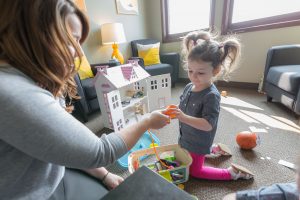De-Masking Our Kids and Managing Their Anxiety
“You may take your mask off if you’d like.”

This is a statement that I’ve been told several times over the past few weeks. It’s my ‘go to’ line while walking a client back to a therapy session in my office. Wow, what a strange feeling. It’s been two years of living with this “temporary normal”.
Is it really safe to take the mask off now? Will we have to put the mask back on again? What if I have food in my teeth? What if someone perceives me differently without my mask? All of those thoughts whirl through my mind as I enter the grocery store, walk my daughter into school, or sit with a client in a therapy session, with nothing covering the bottom half of my face. If I have those worries and fears as an adult, imagine what children and teens must be thinking and feeling.
Is your child struggling to take their mask off? Do they fight you to go to school or insist on keeping their mask close by, just in case? Maybe your child becomes more withdrawn when they eventually take their mask off. Do you notice they aren’t as social or their behavior changes when asked to go mask-free in public? Maybe their grades have changed or they seem nervous about their surroundings.
These are all possible signs of anxiety and are likely due to underlying uncertainty about the change. The mask has become more than just a barrier for germs. For many kids, the mask functions as a security blanket of sorts.
If your child is struggling with anxiety about going mask free, here are a few things you can do to help them:
- Remember, just like when we transitioned towards masking, it will take time to adjust to the change. Try giving your child time and space to explore the change without excessive pressure.
- Meet them where they’re at. Seek to understand their fears by asking questions and try to avoid judgmental or dismissive language. The fear or worry may seem small or silly to you, but it is very real for your child.
- Make a plan with your child, to separate from the mask slowly. Could they wear the mask for part of the day? You could challenge them to go as long as they can without the mask with permission to put it back on if the anxiety becomes overwhelming. Maybe they leave the mask in their pocket, then in their locker, the car, and eventually it stays at home.
- Ask your child questions about what it feels like to take the mask off. What was their experience and did they notice anything that surprised them?
- Reduce avoidance of your own. Do not change plans or avoid situations that will raise the mask issue. Avoidance will perpetuate anxiety for both you and your child.
- If your child is severely anxious or experiencing panic, the sympathetic nervous system is likely activated (think fight flight or freeze response). At this time, reasoning and logical problem solving probably won’t serve you or your child very well. Instead, try using mindfulness techniques with your child, to engage all 5 senses in a soothing way.
- Comfort with touch, a hug, or a gentle back rub (with permission from your child)
- Visualize a safe space such as their bedroom or their favorite place
- Speak slower and more quietly or move to a less overwhelming spot
- Pace breathing; 4 seconds in, 7 seconds hold, 8 seconds out
- A cold ice pack or water on the back of their neck or wrists
- Suck on a sour candy or chew a piece of minty gum
- Lastly, If your child is struggling to function e.g., missing school, struggling with sleep, changes in appetite, severe anxiety, or panic on a weekly basis, it is time to reach out to a professional for support. Psychotherapy can be immensely helpful for both children and adults who are struggling with anxiety.
Lorenz Clinic offers a variety of services such as outpatient psychotherapy, psychiatric medication management, day treatment programs, and home-based family therapy services.
(952) 443-4600

About the Author:
Emily Groteboer-Distad, MS, LPCC, NCC, is a mental health professional, based out of our Rosemount Clinic. She joined Lorenz Clinic in 2021 and has been in the mental health field for 10 years, serving as a practicing clinician for 5 of those years. Emily, her husband, and her daughter call Minnesota home after living in various places while her husband served in the USAF.